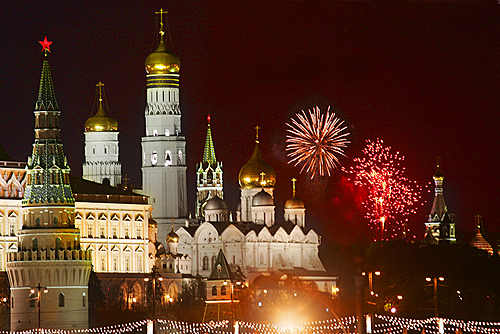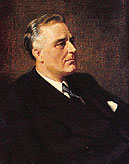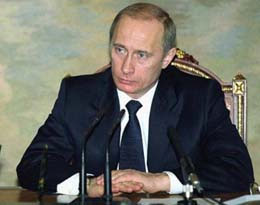This Week in History
May 3-9, 2015
Victory Over Fascism in Europe
May 7-9, 1945
 www.kremlin.ru See wikimedia page for license
Moscow: Victory Day fireworks display. |
After a brutal five-plus-year war, needlessly prolonged by the British Crown, the German Nazi military command surrendered to the Allied Forces on May 7-8 of 1945, marking the defeat of fascism in Europe. Formal surrenders occurred both in Reims, France (May 7) and Berlin, Germany (May 8)—the latter being necessary because the required Soviet military representative was not at hand in France. Accepting the surrender were the military command of the United States, France, Great Britain, and the Soviet Union.
Due to the time zone difference, the victorious conclusion of the European war is celebrated in Russia, and formerly the Soviet Union, on May 9. The war in the Pacific continued until August of 1945.

Franklin Delano Roosevelt. |
The economic power of the United States, built up through the policies of President Franklin Delano Roosevelt, were crucial to the victory. The United States supplied the tanks, planes, ships, firearms, and vast other categories of material not only for its own fighting men, but for its allies as well, including the Soviets. As statesman and economist Lyndon LaRouche has often pointed out, it was the mobilization of logistics in depth, stemming from the “machine tool principle” in American culture, that characterized the US soldiers’ ability to fix anything, build anything, both stateside and in the fields of war, which helped win the war.
Both the Soviet Union and China were critical in securing the victory alongside President Franklin Roosevelt. This war took the lives of 27 million Russians, which was 13% of the entire population of the Soviet Union at that time; it killed approximately 20 million Chinese, according to certain estimates. And the effect of this war remains vividly imprinted in the living memories of those today, whose fathers and brothers, and sometimes even sisters and mothers, fought and died in that war.
 Vladimir Putin. |
Russia’s President Vladimir Putin just published a very rare editorial piece in which he remembered his father, who barely survived the war conditions, and was nearly killed by a Nazi grenade, and his brother, who perished during the siege of Leningrad. That siege lasted over two years, between 1941 and 1944, took over 1 million lives, and left a permanent imprint on the mind of the nation.
Imagine, then, the absolute and utter horror in these nations, when they see a resurgence of neo-Nazi fascism in places like Ukraine, supported and encouraged by the Obama administration. Seven decades after the war’s end, this despicable support for fascism is an unacceptable travesty, in defiance of the tradition of this once-great nation and Office of the Presidency of the United States.
In an interview with EIR editor Tony Papert on May 2, Schiller Institute founder Helga Zepp-LaRouche referenced the impending 70th anniversary celebration of the end of the war in Europe. Scandalously, that celebration will be boycotted by the major Western Allies in that war—the United States, Great Britain, and France, nations who are supporting anti-Russian fascists in Ukraine and other parts of Eastern Europe today. Mrs. Zepp-LaRouche took note, as follows:
 Helga Zepp-LaRouche. |
"You know that we have the 70th anniversary of the end of fascism, and there will obviously be a lot of speeches about Germany and Nazism and this and that and so forth. But if you really think that a lot of what comes from the United States right now, in terms of these policies, is that so much better than what happened 70 years ago?
"And the question, people said, how did it come that the Germans went along with the Nazis? Why was there no more opposition? Why was there not more resistance?
"And I think that that question, Americans have to ask themselves today. Because if this thing is continued, and leads to global war; if there’s a thermonuclear destruction, then it’s a moot question because nobody will ask that question afterwards. But if it’s anything less than that, Americans will have to ask themselves: Why did they allow this to go on for so long, with such terrible consequences around the world?"
As we remember all of those from World War 2, we repeat what we said then- “Never Again!”.
